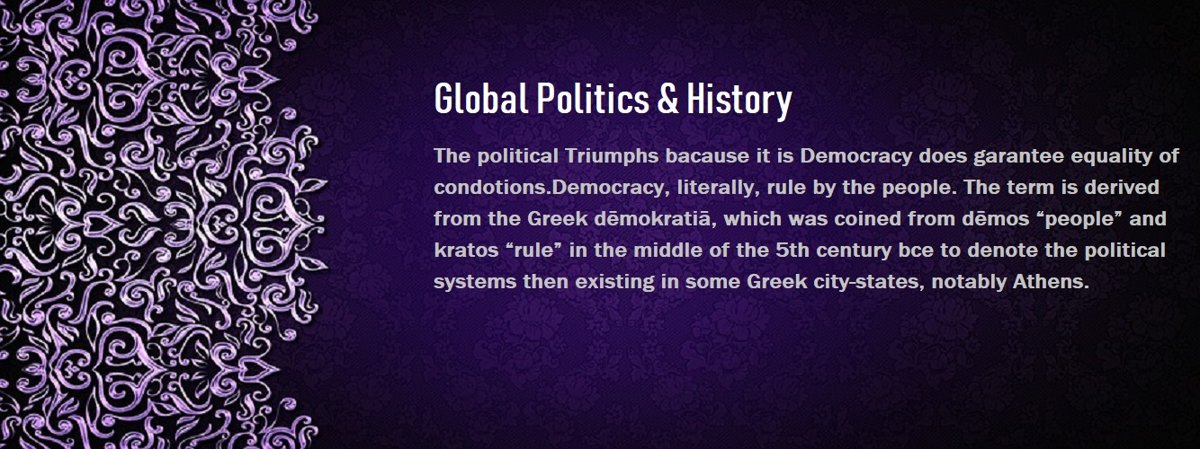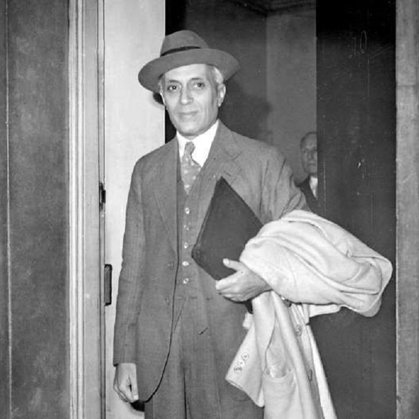JAWAHARLAL NEHRU (1889-1964) INDIA'S THE FIRST PRIME MINISTER AND MAHATMA GANDHI'S TRUSTED ALLY.HE'S CONSIDERED TO BE THE ARCHITECT TO THE MODERN INDIAN NATION STATE:A SOVEREIGN,SOCIALIST,AND DEMOCRATIC REPUBLIC.
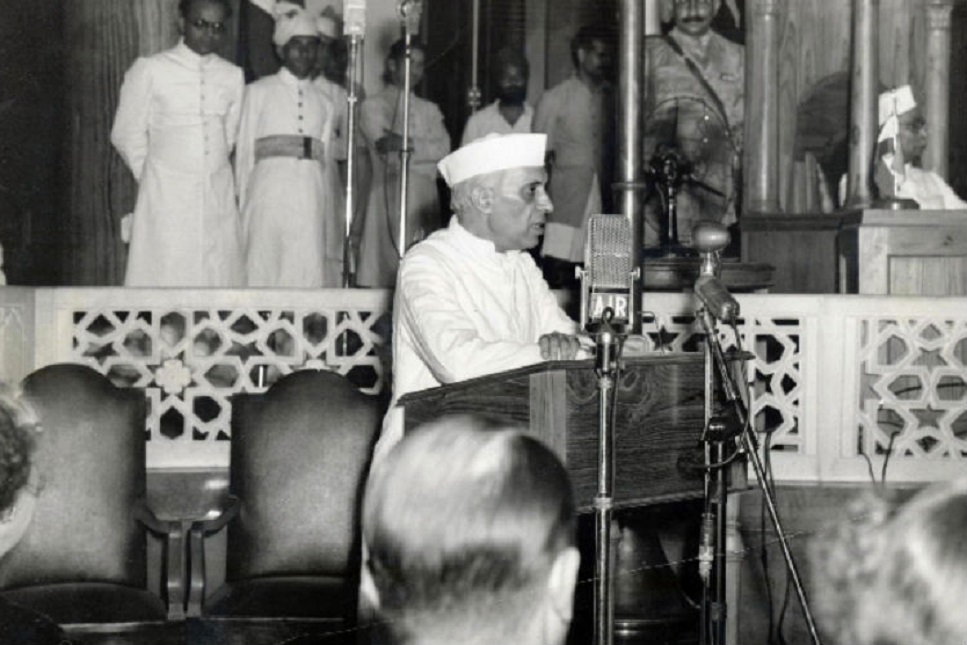 In the independence and partition of British India of 1947.PM Nehru delivers speech in the Constitution Assembly.Addressing the nation is serious business because leaders save it for momentous occasions, such as our first Prime Minister Jawaharlal Nehru’s Tryst with Destiny speech at midnight on August 14-15, 1947, as India became independent.
In the independence and partition of British India of 1947.PM Nehru delivers speech in the Constitution Assembly.Addressing the nation is serious business because leaders save it for momentous occasions, such as our first Prime Minister Jawaharlal Nehru’s Tryst with Destiny speech at midnight on August 14-15, 1947, as India became independent.
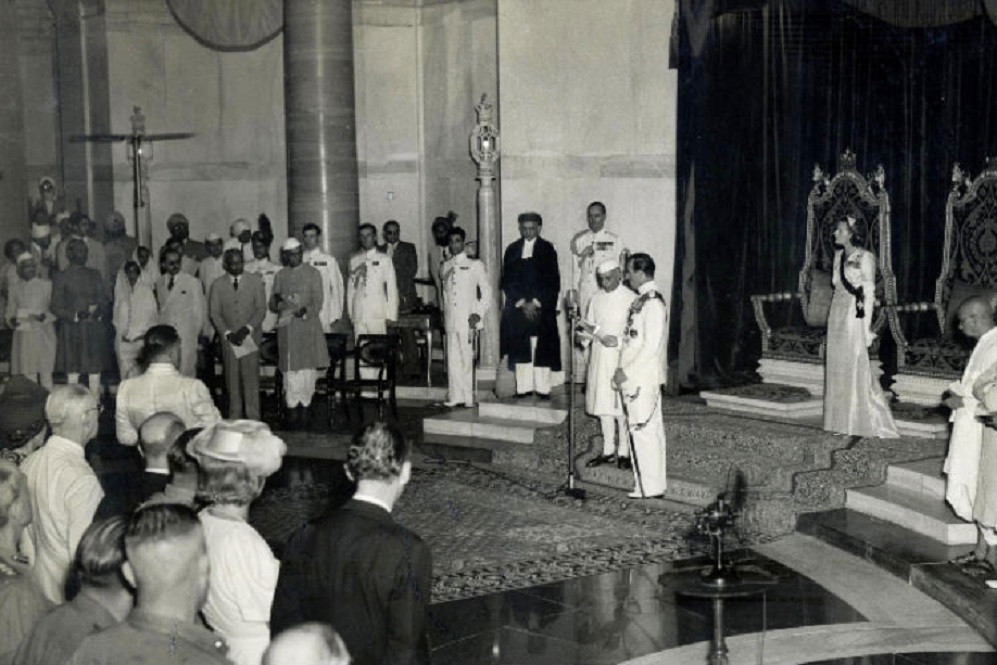 Lord Mountbatten swears in Jawaharlal Nehru as the first Prime Minister of free India on Aug 15, 1947.The original Independence plan was for the British to transfer power by June 1948. But the appointment of Lord Mountbatten as the new viceroy in February 1947 changed that.After a historic meeting with the major political parties on June 3, Mountbatten decided on the date of August 15. He apparently thought of the date to be lucky for him because it was the day two years earlier that the Japanese had surrendered to him at the end of World War II.
Lord Mountbatten swears in Jawaharlal Nehru as the first Prime Minister of free India on Aug 15, 1947.The original Independence plan was for the British to transfer power by June 1948. But the appointment of Lord Mountbatten as the new viceroy in February 1947 changed that.After a historic meeting with the major political parties on June 3, Mountbatten decided on the date of August 15. He apparently thought of the date to be lucky for him because it was the day two years earlier that the Japanese had surrendered to him at the end of World War II.
India's first Prime Minister and Mahatma Gandhi's trusted ally, Jawaharlal Nehru was one of the leaders during the Indian freedom struggle.Jawaharlal Nehru was born on Nov. 14, 1889, in Allahabad into a proud, learned Kashmiri Brahmin family. His father, Motilal Nehru, was a wealthy barrister and influential politician. Jawaharlal was an only child until the age of 11, after which two sisters were born. The atmosphere in the Nehru home was more English than Indian; English was spoken. It was also a luxurious home, with an impressive stable and two swimming pools. Jawaharlal was educated at home by tutors, most of them English or Scottish. Under the influence of a tutor Nehru joined the Theosophical Society.At the age of 15 Nehru left for England, where he studied at Harrow and Cambridge and then for the bar in London. He was called to the bar in 1912. His English experience reinforced his elegant and cosmopolitan tastes. As Nehru said of himself at Cambridge, "In my likes and dislikes I was perhaps more an Englishman than an Indian." In London he was attracted by Fabian ideas; nationalism and socialism from this time on provided his intellectual motive force.He was one of the senior leaders to have organised rallies and to administer the masses with the Indian National Congress. He is also considered to be the architect of the modern Indian nation-state: a sovereign, socialist, secular, and democratic republic. Jawaharlal Nehru or 'Chacha' Nehru, as he is still called by many, had designed most of India's foreign policies and took care of the internal issues that cropped up during his tenure as the apex minister. In 1947, Jawaharlal Nehru became the first person to hoist the national flag at the Red Fort.Nehru was one of the architects to steer the nascent nation towards the brilliance envisioned by countless revolutionaries of the Indian Freedom struggle. Pandit Nehru passed away on May 27, 1964.Nehru went to England and completed his studies at Harrow and Trinity College, Cambridge. His classmates there could not pronounce his long him, and nicknamed him “Joe Nehru.”Besides, begin a wannabe ICS, Joe studied natural sciences during his years at the Trinity College. He was weak in math and requested a permission to study botany as an alternative while completing his Law Degree from Inner Temple.Back in India, Nehru began to practice law with his father. It was not until 1917 that Nehru was stirred by a political issue, the imprisonment of Annie Besant, an Irish theosophist devoted to Indian freedom. As a result, Nehru became active in the Home Rule League. His involvement in the nationalist movement gradually replaced his legal practice. In 1916 Nehru was married to Kamala Kaul, of an orthodox Kashmiri Brahmin family. They had one daughter (later Indira Gandhi, third prime minister of independent India).Apart from his father and Besant, the greatest influence on Nehru politically was Mohandas Gandhi. Gandhi had been educated much like Nehru but, unlike him, remained basically untouched, essentially Indian. A second issue which fired Nehru's nationalism and led him to join Gandhi was the Amritsar massacre of 1919, in which some 400 Indians were shot on orders of a British officer.The year 1920 marked Nehru's first contact with the Indian kisan, the peasant majority. Nehru was "filled with shame and sorrow … at the degradation and overwhelming poverty of India." This experience aroused a sympathy for the underdog which characterized many of Nehru's later political moves. The plight of the peasant was a challenge to his socialist convictions, and he attempted to persuade the peasants to organize. From this time on Nehru's concerns were Indian. He began to read the Bhagavad Gita and practiced vegetarianism briefly.In 1921 Nehru followed Gandhi in sympathy with the Khilafat cause of the Moslems. Nehru was drawn into the first civil disobedience campaign as general secretary of the United Provinces Congress Committee. Nehru remarked, "I took to the crowd, and the crowd took to me, and yet I never lost myself in it." Nehru here articulated two of his most distinctive traits throughout his career: his involvement with the people and his aloof and lonely detachment. The year 1921 also witnessed the first of Nehru's many imprisonments. In prison his political philosophy matured, and he said that he learned patience and adaptability. Imprisonment was also a criterion of political success.
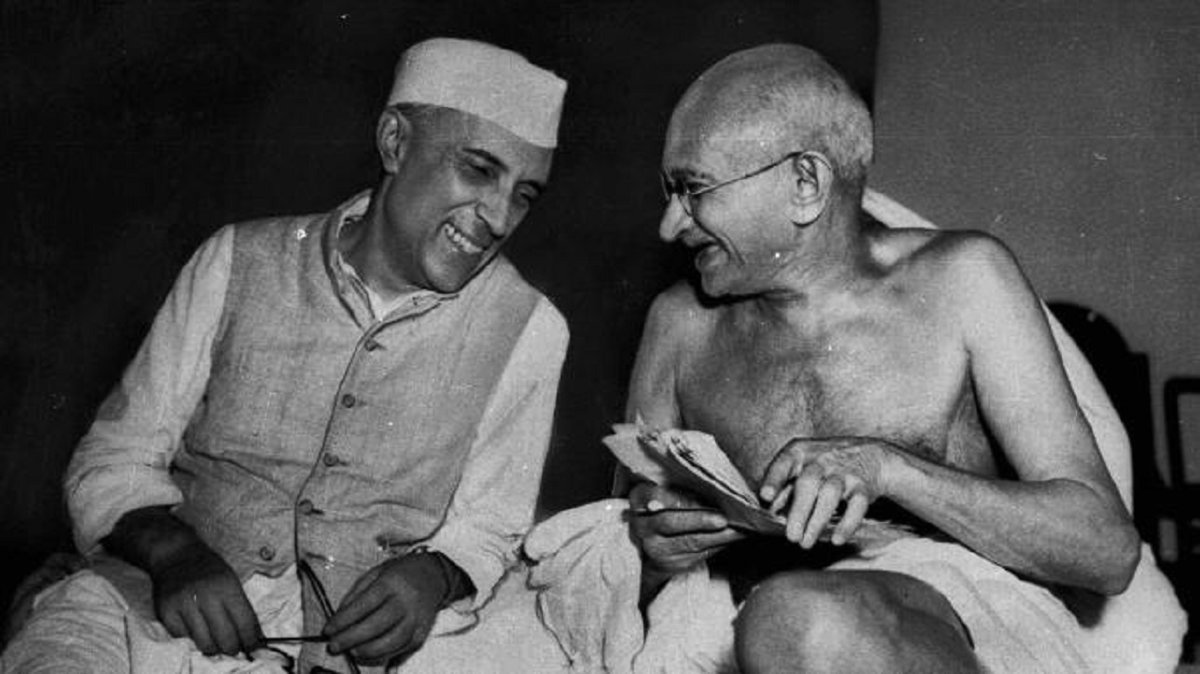 India's first Prime Minister and Mahatma Gandhi's trusted ally, Jawaharlal Nehru was one of the leaders during the Indian freedom struggle.Jawaharlal Nehru as a passionate Indian freedom fighter, who later went on to became the first Prime Minister of India. He served the nation for almost 17 successive years (1947 – 1964)
India's first Prime Minister and Mahatma Gandhi's trusted ally, Jawaharlal Nehru was one of the leaders during the Indian freedom struggle.Jawaharlal Nehru as a passionate Indian freedom fighter, who later went on to became the first Prime Minister of India. He served the nation for almost 17 successive years (1947 – 1964)
Mahatma Gandhi and Jawaharlal Nehru were two peaks of the India’s freedom struggle. Nehru' was variously influenced by Gandhiji. However, there were some differences between Gandhi and Nehru.Gandhi was oriental in his outlook. He derived inspiration from the cultural heritage of this land. The life of Buddha, Mahavir and other saints had tremendous impact upon him.Nehru, on the other hand was westernized in his outlook. His ideas were pragmatic. The western education had instilled into his nerves a radical outlook and he wanted to exhibit it as per the demand of-the situation.Gandhi envisaged a spiritualised democracy. Neither property" nor position in the society but manual work should be the basis of village republic. It will be a state devoid of corruption and hypocrisy.Nehru was the champion of parliamentary democracy. He had belief in the Parliament, judiciary, press, public pinion etc. Universal adult suffrage, to him, should be the basis of democracy.Cottage industry with emphasis on hand spinning, hand-weaving, Khadi, trusteeship etc. were the ideas of Gandhi to create a self-sufficient economy.Nehru, on the other hand, followed democratic socialism and put emphasis on cooperative movement, massive industrialization, scientific and technological advancement etc. which formed the principles of Nehru for the economic advancement of the country.Gandhi viewed that India should not poke her nose in the foreign affairs which is detrimental for the growth of the country.Nehru, on the other hand, became a promoter of world peace. With his ideas of Panchasheel, non-alignment, faith on U.N.O. he tried to develop friendship with the neighboring countries and other countries of the world for the upliftment of India.Gandhi's ideas were basically spiritual and he was uncompromising with his principle of truth, non-violence and purity.Nehru never attached due importance to spiritualism. His ideas were rational, pragmatic and global. He wanted to compromise with the situation when circumstances demanded.Gandhi was quite traditional in his approach. He never needed doctors, police, and machines and wanted to pursue traditional methods to realize the ends.Nehru never believed such things. He had faith on doctors, police, press, machines and he wanted to promote welfare of the society through them.With all his benign smile, hard work, traditional -approach, Gandhi was regarded as the 'Father of the Nation'.With all his pragmatic outlook, dream to modernize India, massive industrialization etc. Nehru became the architect of the modern India.Gandhi believed in non-violence and he wanted to disarm even his opponents by that.On the other hand Nehru believed in reality. Whenever situation becomes beyond control, he told to use force for restoring law and orderThe British colonial rulers, the non-violent Gandhi, India’s first prime minister,Nehru and his Hindu “Congress party” gradually turned up the heat on the British. The goal was more Influence in government and eventually self-rule.At the same time the well-known activist Mahatma Gandhi entered the protest movement arena. The tension between Hindus and Muslims was building up. Gandhi promoted peaceful co-existence between the two groups – fully united in a future independent India.When one is called the ‘Father of the Nation’ and the other being the First Prime Minister of India. it is but natural for us to think that these two people were the ones who were biggest threat to the British rule and it is because of their leadership that India attained freedom. Even though this is how the history has been written in India,The reality is complete opposite. There are many instances which show that British always had a soft corner for Gandhi and Nehru, the British strangely did not follow the same approach when it came to crack down on the two ‘Biggest’ leaders of the country. So naturally it raises a very important question among those who evaluate the personalities based on facts and not on fairy tales.What was the reason that Nehru and Gandhi were treated like special guests by Britishers and while rest of the freedom fighters were forced to live in inhuman conditions, perform hard labor for years, Nehru was permitted to write books and also take long leaves from jail. Why did the cruel Britishers follow this dual standard when it came to Nehru and Gandhi? But surprisingly that did not happen. It is alleged by many that Nehru and Gandhi were used as pawns by British to plan a safe exit from India and it is due to Nehru and Gandhi that the British could loot India for many years more than what they could have, had Subhash Chandra Bose or Veer Savarkar were let free as the British let Gandhi and Nehru.As per an argument made by a few historians, cellular jail was meant for real freedom fighters who posed real threat to the Britishers and not faux freedom fighters like Nehru who allegedly derailed India’s independence struggle. So, the historians say, the British not only treated the duo differently but also handed over power to their loyal stooges.While the liberals will try to explain that Nehru and Gandhi were political prisoners and hence were not subjected to rigorous punishment the fact of the matter is that these two acted in favor of British and the British used them as pawns to loot the country for as long as they could and then passed on the baton to Nehru to continue to loot the remainder of the country. It is now well evident that Nehru-Gandhi (Indira and the next generations) have not only looted the country and but also have acted against the welfare of the people of the country.
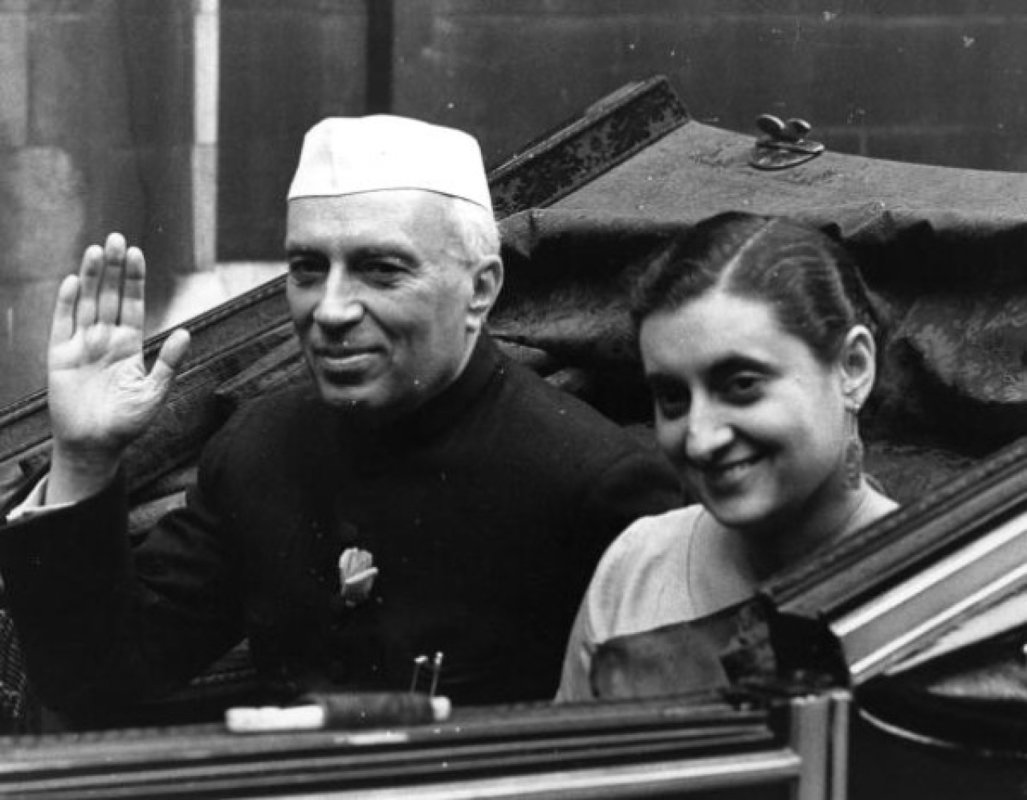 Jawaharlal Nehru could have set an example and kept his daughter out of politics instead of making her the Congress President. This was the first big nepotistic step in Indian politics which was later justified on all kinds of specious grounds by many Nehru acolytes.Nehru, however, played a sterling role in keeping India together in its most critical years after Independence. He was not alone in this, but without his whole hearted support to the making of the Indian Constitution.
Jawaharlal Nehru could have set an example and kept his daughter out of politics instead of making her the Congress President. This was the first big nepotistic step in Indian politics which was later justified on all kinds of specious grounds by many Nehru acolytes.Nehru, however, played a sterling role in keeping India together in its most critical years after Independence. He was not alone in this, but without his whole hearted support to the making of the Indian Constitution.
In 1926-1927 Nehru took his wife to Europe for her health. This experience became a turning point for Nehru. It was an intellectual sojourn, highlighted by an antiimperialist conference in Brussels. Here Nehru first encountered Communists, Socialists, and radical nationalists from Asia and Africa. The goals of independence and social reform became firmly linked in Nehru's mind. Nehru spoke eloquently against imperialism and became convinced of the need for a socialist structure of society. He was impressed with the Soviet example during a visit to Moscow.Back in India Nehru was immediately engrossed in party conferences and was elected president of the All-India Trades Union Congress. In speeches he linked the goals of independence and socialism. In 1928 he joined the radical opposition to proposals for dominion status by his father and Gandhi. In 1930 Gandhi threw his weight to Nehru as Congress president, attempting to divert radicalism from communism to the Congress.In 1930 Nehru was arrested and imprisoned for violation of the Salt Law, which Gandhi also protested in his famous "salt march." Nehru's wife was also arrested. From the end of 1931 to September 1935 Nehru was free only 6 months.During the 1937 elections the Moslem League offered to cooperate with the All-India Congress Committee in forming a coalition government in the United Provinces. Nehru refused, and the struggle between the Congress and the Moslem League was under way. Nehru also established the precedent for economic planning in a suggestion that the Congress form a national planning committee. In 1938 Nehru paid a brief visit to Europe. On his return he was sent briefly as envoy to China until war intervened and made it necessary for him to return.War in Europe drew India in, together with England. For Indian leaders the question was how an honorable settlement could be reached with England and still allow India to participate on the Allied side. Negotiations toward this end culminated in the Cripps mission and offer of dominion status in March 1942. Nehru refused to accept dominion status, as did the rest of Congress leadership. There followed the Congress "Quit India" resolution and the imprisonment of Nehru, Gandhi, and other Congress leaders until June 1945. There were nationwide protests, a mass demand for independence.Nehru became the General Secretary of the All India Congress Committee in September 1923. He toured Italy, Switzerland, England, Belgium, Germany and Russia in 1926. In Belgium, he attended the Congress of Oppressed Nationalities in Brussels as an official delegate of the Indian National Congress. He also attended the tenth anniversary celebrations of the October Socialist Revolution in Moscow in 1927. Earlier, in 1926, at the Madras Congress, Nehru had been instrumental in committing the Congress to the goal of Independence. While leading a procession against the Simon commission, he was lathi-charged in Lucknow in 1928. On August 29, 1928 he attended the All-Party Congress and was one of the signatories to the Nehru Report on Indian Constitutional Reform, named after his father Shri Motilal Nehru. The same year, he also founded the ‘Independence for India League’, which advocated complete severance of the British connection with India, and became its General Secretary.In 1929, Pt. Nehru was elected President of the Lahore Session of the Indian National Congress, where complete independence for the country was adopted as the goal. He was imprisoned several times during 1930-35 in connection with the Salt Satyagraha and other movements launched by the Congress. He completed his ‘Autobiography’ in Almora Jail on February 14, 1935. After release, he flew to Switzerland to see his ailing wife and visited London in February-March, 1936. He also visited Spain in July 1938, when the country was in the throws of Civil War. Just before the court-break of the Second World War, he visited China too.Nehru offered a variant in his formula for India's developmentn"heavy engineering and machine-making industry, scientific research institutes, and electric power." He certainly shared in the Attlee consensus. His adoption of the themes and ideas of the Labor Party was evident in his recurrent evocation of the commanding heights, the mixed economy, and the need for planning. But he was also much impressed with the Soviet model, and embraced five-year plans and central planning. While troubled by what communism did to freedom, he wrote during his last term in prison that "the Soviet Revolution had advanced human society by a great leap and had lit a bright flame which could not be smothered and that it laid the foundation for a new civilization toward which the world could advance." Private property, yes, but it was to be subordinate to the state in the building of the Indian economy.
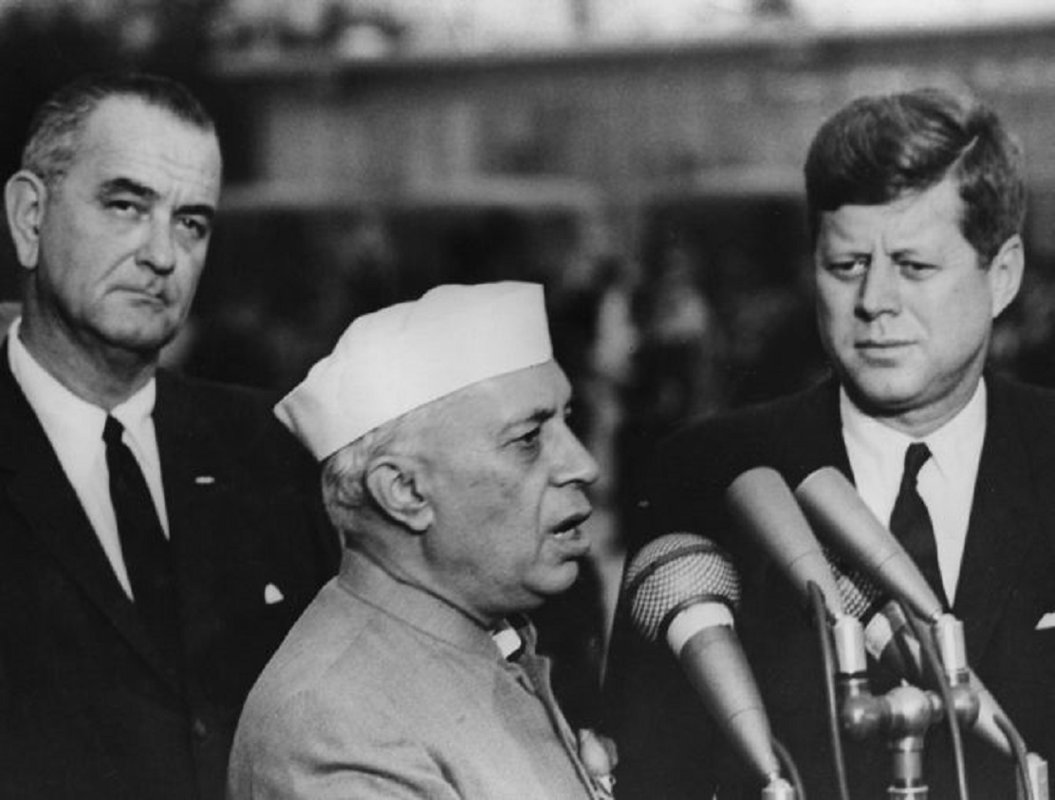 Kennedy, who was an admirer of India’s democracy and held its leader Jawaharlal Nehru in very high esteem, felt that democratic India, not communist China, should be the first Asian country to conduct a nuclear test. So, it is said, that the President sent a letter, written in his own hand, to Nehru offering help to India to conduct a nuclear test, and that accompanying the Kennedy letter was a technical note from the chairman of the US Atomic Energy Commission setting out the assistance his organization would provide to Indian nuclear scientists to detonate an American device from a top of a tower in the Rajasthan desert.
Kennedy, who was an admirer of India’s democracy and held its leader Jawaharlal Nehru in very high esteem, felt that democratic India, not communist China, should be the first Asian country to conduct a nuclear test. So, it is said, that the President sent a letter, written in his own hand, to Nehru offering help to India to conduct a nuclear test, and that accompanying the Kennedy letter was a technical note from the chairman of the US Atomic Energy Commission setting out the assistance his organization would provide to Indian nuclear scientists to detonate an American device from a top of a tower in the Rajasthan desert.